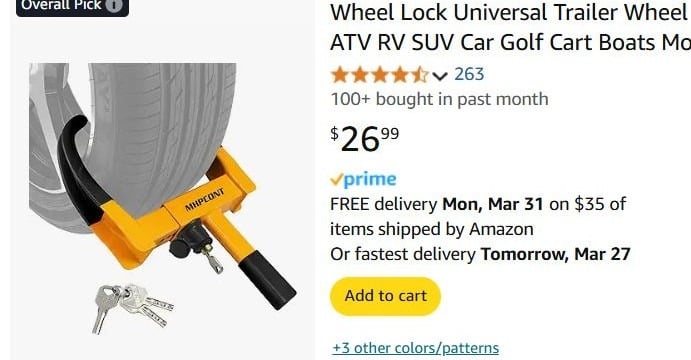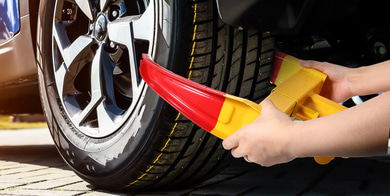The $30 "Business Opportunity" - The Disturbing Rise of Vehicle Booting Businesses
4/8/20242 min read


$30 and a Car Trunk
In my investigation of the predatory booting crisis affecting seniors and disabled residents across Denver Metro, I discovered something shocking: the very same boot devices used to immobilize vehicles at properties like Conter Estates are available for anyone to purchase on Walmart and Amazon's websites for approximately $30 each.
That's right—for less than the cost of dinner for two, anyone can purchase the equipment needed to start a vehicle immobilization "business." Put a few in your car trunk, print some official-looking invoices, and you're ready to start charging $160 per release.
Night-Time Operations and Zero Accountability
What makes this situation particularly alarming is how these operations typically function:
After-Hours Enforcement: Most booting occurs at night when management offices are closed and when residents have no immediate recourse.
No Human Interaction: Companies like ParkingManagement.net operate without live phone support—only voicemail and email that rarely receive prompt responses, unless you're paying cash.
Cash or Card Only: $160 fees must be paid on the spot, by cash or credit card only, with no option for payment plans or appeals.
Minimal Overhead: With boots costing just $30 each, companies can generate over 500% profit on each installation, with minimal investment in equipment, personnel, or customer service.
A New Type of Extortion Racket
Let's call this what it is: a form of legalized extortion. When a resident wakes up to find their vehicle immobilized, they face impossible choices. Pay $160 immediately or:
Miss work and lose income
Miss medical appointments
Remain isolated and unable to obtain food or medication
Risk towing and further financial penalties
For seniors and disabled residents on fixed incomes, this $160 demand creates an immediate financial crisis. Many are forced to choose between regaining their mobility and affording other essentials like groceries or medication.
No Regulation, No Oversight
What makes this practice particularly egregious is the complete lack of regulation. While towing companies in Colorado must adhere to the Colorado Towing Bill of Rights (HB22-1314), there are currently no comparable protections against predatory booting.
This regulatory gap has created a Wild West environment where virtually anyone can purchase boots online, claim some form of authority, and begin immobilizing vehicles—often with the blessing of property management companies who benefit from this arrangement through kickbacks or reduced parking enforcement costs.
Time for Legislative Action
The low barrier to entry and high-profit potential of DIY booting operations make legislative action all the more urgent. We need regulations that:
Require licensing and registration for any entity performing vehicle immobilization
Mandate clear signage, prior warnings, and due process before booting
Set reasonable maximum fees aligned with actual costs
Ensure 24/7 release services with live human support
Create a formal dispute resolution process
Prohibit contracting structures designed to evade accountability
Without these protections, we're essentially allowing anyone with $30 and a car trunk to hold our community's residents hostage.
Join Our Fight
At Stop The Boot we're building a coalition to demand the same protections against booting that was fought for with towing.
This isn't just about cars—it's about protecting our most vulnerable neighbors from what amounts to a night-time hit-and-run extortion racket operating in the shadows of our communities.
Join us by sharing your story, signing our petition, and contacting your representatives to support our legislative push for accountability and fairness in vehicle immobilization practices.
For media inquiries or legislative meetings, please contact media@stoptheboot.org
When most of us think about vehicle immobilization, we imagine it as a regulated public service—something controlled by municipal authorities with clear guidelines and accountability.
The reality, especially in some Colorado communities, is far more troubling.
Join us in making a difference today!
© 2025. All rights reserved.
Community Action Creates Legislative Change
We know that the super power of our communities is to advocate for change. So join us and make your voice heard through our website.
We're dedicated to impactful legislative outreach.
